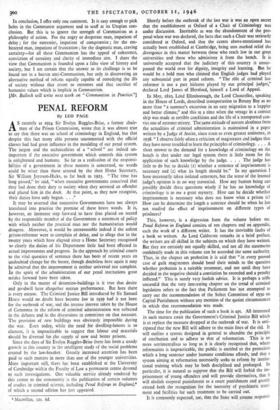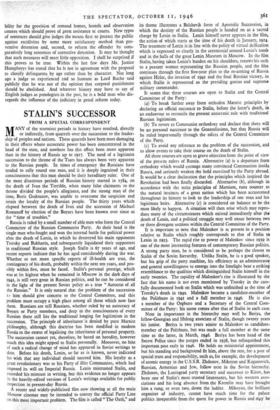PENAL REFORM
By LEO PAGE
S recently as 1924 Sir Evelyn Ruggles-Brise, a former chair- man of the Prison Commission, wrote that it was almost true to say that there was no school of criminology in England, but that
despite this fact many able persons unconnected with the official classes had had great influence in the moulding of our penal system. The jargon and the technicalities of a " school " are indeed un- important if the executive government which controls this system is enlightened and humane. So far as a realisation of the responsi- bilities of a government in these matters is concerned, no words could be wiser than those uttered by the then Home Secretary, Sir William Joynson-Hicks, as far back as 1925. "The- time has long passed," he said, "when executive governments conceived that they had done their duty to society when they arrested an offender and placed him in the dock. At that point, as they now recognise, their duties have only begun. . . ."
It may be asserted that successive Governments have not always translated into practice the promise of these brave words. It is, however, an immense step forward to have thus placed on record by the responsible member of the Government a statement of policy with which neither the practical man nor the humanitarian would disagree. Moreover, it would be unreasonable indeed if the ardent prison-reformer were to complain of delay, and to allege that in the twenty years which have elapsed since a Home Secretary recognised so clearly the duties of his Department little had been effected in
actual improvement and progress. In the approach by criminal courts to the vital question of sentence there has been of recent years an•
niadoubted change for the better, though doubtless here again it may he admitted that the improvement is neither universal nor complete. In the spirit of the administration of our penal institutions great strides forward have been taken.
Only in the matter of detention-buildings is it true that desire and goodwill have altogether outrun performance. But here there is every excuse. The Criminal Justice Bill introduced by Sir Samuel Hoare would no. doubt have become law in 1939 had it not been for the outbreak of war, and the intense interest taken by the House of Commons in the reform of criminal administration was reflected in the debates and in the discussions in committee on that measure. The provision of new buildings was obviously impossible during
the war. Even today, while the need for dwelling-houses is so clamant, it is impracticable to suggest that labour and materials should be diverted for tthe supply of new and better prisons.
Since the days of Sir Evelyn Ruggles-Brise there has been a steady growth in this country in the intelligent study of the social problems created by the law-breaker. Greatly increased attention has been paid to such matters in more than one of the younger universities. More important still, there has been established at the University of Cambridge within the Faculty of Law a permanent centre devoted to such investigations. One valuable service already rendered by this centre to the community is the publication of certain volumes of studies in criminal science, including Penal Reform in England,* of which a second edition has just appeared.
*Macmillan, 12s. 6d. Shortly before the outbreak of the last war it was an open secret that the establishment at Oxford of a Chair of Criminology was under discussion. Inevitable as was the abandonment of the pro- posal when war was declared, the facts that such a Chair was seriously considered at Oxford, and that the centre above-mentioned has actually been established at Cambridge, bring into marked relief the ilivergence in this matter between those who teach law in our great universities and those who administer it from the bench. It is universally accepted that the judiciary of this country is unsur- passed the world over for dignity, integrity and learning. But he would be .a bold man who claimed that Eng,lish judges had played any substantial part in penal reform. "The role of criminal law reformer is not a part hitherto played by our principal judges," declared Lord James of Hereford, himself a Lord of Appeal.
In May, 181o, Ldrd Ellenborough, the Lord Chancellor, speaking in the House of Lords, described transportation to Botany Bay as no more than "a summer's excursion in an easy migration to a happier and better climate," and this at a time when the voyage in a convict ship was made in terrible conditions and the life of a transported con- vict one of extreme misery. The sameattitude of austere aloofness from the actualities of criminal administration is maintained in a paper written by a Judge of Assize, since risen to even greater eminence, in 1938. "I observe fairly .often a criticism of magistrates and judges that they have never troubled to learn the principles of criminology. . . . A short answer to the demand for a knowledge of criminology on the bench is that under our legal system there is little room for the application of such knowledge by the judge. . . . The judge has little to do but to decide (t) whether a sentence of imprisonment is necessary and (2) what its length should be." In my quotation I have necessarily taken isolated sentences, but the sense Of the learned judge's opinion is in no way travestied. How any human being can possibly decide these questions wisely if he has no knowledge of criminology is to me a great mystery. How can he decide whether imprisonment is necessary who does not know what a prison is? How can he determine the length a sentence should be when he has not studied the effect of imprisonment on different types of prisOners?
This, however, is a digression from the volume before me. Penal Reform in England consists of ten chapters and an appendix, each the work of a different writer. It has the inevitable faults of a book so written. As Lord, Caldecate remarks in a brief preface, the writers are' all skilled in the subjects on which they have written. But they are certainly not equally, skilled, and not all the statements confidently, made in this volume can be accorded the same authority. Thus, in the chapter on probation it is said that "in every proved case of guilt magistrates should bend their minds to the question whether probation is a suitable treatment, and not until they have decided in the negative shciuld a conviction be recorded and a penalty inflicted." This is surely very foolish advice. It is perhaps a trifle uncandid that the very interesting chapter on the trend of criminal legislation refers to the fact that Parliament has -not attempted to carry out the recommendation of the Select Committee of 1930 on Capital Punishment without any mention of the quaint circumstances in which that recommendation was made.
The time for the publication of such a book is apt. All interested in such matters await the Government's Criminal Justice Bill which is to replace the measure dropped. at the outbreak of war. It is anti- cipated that the new Bill will adhere to the main lines of the old. It will outline a system designed in general to abandOn the principle of retribution and to adhere to that of reformation. This is no mere sentimentalism so long as it is clearly recognised that, where reformation is impracticable, the public is entitled to the protection which a long sentence under humane conditions affords, and that a system aiming at reformation necessarily seeks to reform by institu- tional training which may be both disciplined and prolonged. In particular, it is natural to suppose that the Bill will forbid the im- prisonment of young offenders and will provide. alternatives, that it will abolish corporal punishment as a court punishment and greatly extend both the recognition for the necessity of psychiatric treat- ment and facilities for such treatment to be carried out.
It is commonly expected, too, that the State will assume responsi- bility for the provision of remand homes, hostels and observation centres which should prove of great assistance tc courts. New types of sentences should give judges the means first to Protect the public against recidivists by some more satisfactory method than pre- ventive detention and, second, to reform the offender by com- paratively long sentences of corrective detention. It may be thought that such measures will meet little opposition. I shall be surprised if this proves to be true. Within the last few days Mr. Justice Humphreys has stated that he is not in agreement with the proposal to classify delinquents by age rather than by character. Not long ago a judge so experienced and so humane as Lord Roche said publicly that he was not of the opinion that corporal punishment should be abolished. And whatever history may have to say of English judges as penologists in the past, he is a bold man who dis- regards the influence of the judiciary in penal reform today.































 Previous page
Previous page